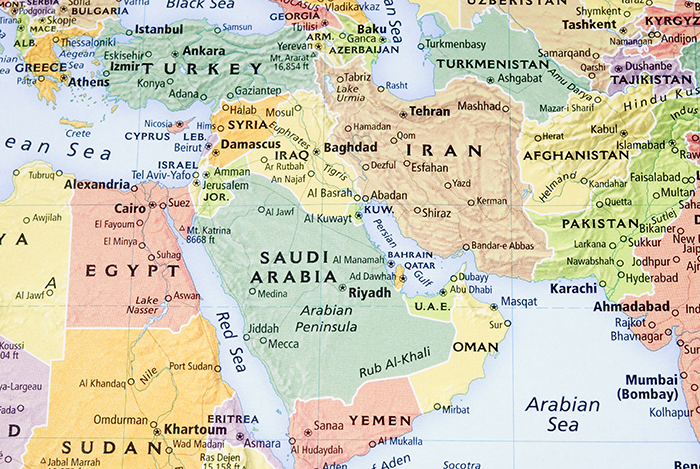Analyses / Middle East / North Africa
20 March 2025
Arab Diplomacy Under Strain: Strategic Response or Admission of Weakness?

The presentation of the “Trump Plan” on 5 February 2025, which aimed to relocate the population of the Gaza Strip in order to take control of it and transform it into a seaside resort, quickly provoked strong international reactions. Faced with widespread rejection from Arab countries, the US President backtracked, although he still described his plan as “the path to take”.
However, the shock value of these statements nonetheless served a purpose for Donald Trump, prompting Arab countries to develop a counter-proposal. These countries then demonstrated their activism regarding the fate of the Palestinians through three successive meetings.
To what extent does the Arab counter-proposal to the “Trump Plan” reflect a desire by Arab states to assert themselves, while also exposing their limitations?
Arab countries and the fate of Gazans
Saudi Arabia took up the issue by organising a first meeting in Riyadh on 21 February 2025. Bringing together Qatar, the United Arab Emirates, Egypt, Jordan, Kuwait and Bahrain, it served as a prelude to the Arab League summit, announced in the following days.
After several postponements, the summit was finally held on 4 March 2025, during which Egypt was able to present its plan and gain the approval of League members. Cairo had little choice but to get involved, as its territory was designated in the “Trump Plan” as a host land, alongside Jordan.
Having firmly rejected the idea of relocating Gazans, this “Arab Plan” outlines two phases leading to a two-state solution. The first focuses on emergency measures, with a $5 billion budget, while the second involves a large-scale reconstruction programme extending to 2030, with a $48 billion budget.
Finally, an extraordinary session of the Organisation of Islamic Cooperation (OIC) was held on 7 March 2025 in Jeddah to ensure that the plan “becomes both an Arab and Islamic plan”, according to the Egyptian Minister of Foreign Affairs.
Although this initiative is supported by all the countries involved, it remains fragile due to persistent divergences.
Divergences in a Middle East differently marked by confrontations with Israel
These were illustrated by the absence of Saudi and Emirati officials at the Arab League summit and are particularly pronounced regarding the role of Hamas. In this regard, the Arab League communiqué remains vague, stating that the organisation “should no longer govern Gaza nor pose a threat to Israel.” This suggests the removal of its military status but does not clearly outline its future political role. Accordingly, Hamas agreed not to participate in the administrative commission tasked with supervising the enclave.
Qatar, due to its ties with the organisation, and Saudi Arabia, out of a certain pragmatism, refuse to exclude Hamas entirely from any political process and instead call for its step back. This stance is justified by the fact that Hamas still retains significant control over Gaza and could derail the plan if it proves too unfavourable. Meanwhile, the UAE maintains its opposition to groups linked to the Muslim Brotherhood, including Hamas, and favours governance by the Palestinian Authority, despite its ongoing lack of credibility among Palestinians.
Beyond these strategic divergences, it is important to distinguish between states directly confronted with Israel and those that have not been. The former tend to prioritise managing their internal issues and limit their engagement to avoid political destabilisation.
Syria, facing the challenges of an inclusive political transition, must also deal with attempts at destabilisation by the Israeli state, notably through the instrumentalisation of its Druze minority. While seeking to preserve ties with Israel, interim President Ahmed al-Charaa focuses primarily on demanding the withdrawal of Israeli troops from Syrian territory.
Likewise, Lebanon remains frozen in a fragile ceasefire with Israel, where the Israeli army continues daily operations. Its room for manoeuvre is therefore limited, as it is engaged in negotiations on the demarcation of its southern border.
Undeniably, Gulf countries find themselves in a more comfortable position and are even being courted by US diplomacy.
In this sense, although Donald Trump sought to revive the Israeli-Saudi normalisation project, Saudi Arabia assumed a certain leadership role around Gaza. The Israeli ambassador to the United States declared on 29 January 2025 that this project was “closer than ever.” However, the events of 7 October 2023 forced Saudi diplomacy to harden its stance, advocating a Palestinian state based on pre-1967 borders with East Jerusalem as its capital. Riyadh thus appears to be a regional lock on normalisation: if it were to proceed, it could pave the way for other Arab countries.
The United Arab Emirates, adopting a more moderate line, did not firmly condemn the “Trump Plan”, unlike Riyadh.
Beyond an uncertain front, the second fundamental limitation of the “Arab Plan” lies in the lack of external support.
A limited Arab initiative?
The proposed plan is based on the support of foreign funds, including the European Union and the World Bank to the tune of $15 billion, alongside Saudi Arabia, the UAE and Qatar. Following the OIC meeting, its council urged the international community and financial institutions to quickly provide the necessary support for the plan.
Although António Costa, President of the European Council, attended the Arab League summit, the initiative received no official backing from the European Commission. This restraint is explained by the desire to avoid opening a new front with the American president at a time when Europe is attempting to mobilise around the defence of Ukraine. Despite this caution, France has timidly aligned itself with the Arab initiative and will co-chair, alongside Saudi Arabia, a United Nations conference on the two-state solution in June 2025.
President Donald Trump’s declarative and transactional foreign policy freezes the Palestinian question by refusing to allow a counter-proposal to emerge. His plan is, in fact, more of a suggestion, ignoring two fundamental realities: Gazans do not wish to leave the enclave, and Arab countries refuse to take them in.
Despite its rejection of the “Arab Plan”, the US administration maintains an ambivalent position. On 13 March 2025, Donald Trump stated there would be no expulsion of Palestinians, without however ruling out their departure—at least temporarily. For his part, Steve Witkoff, the US special envoy to the Middle East, described the plan as “a first step in good faith” containing “compelling features.” The envoy is also conducting indirect negotiations with Hamas to secure the release of US hostages.
However, the “Arab Plan” is bound to be rejected by Tel Aviv, which has shown no interest in the reconstruction of Gaza and instead favours the transfer of its population. Donald Trump’s statements on the matter have been interpreted as a green light for the most radical proposals. These materialise in the plan of far-right Finance Minister Bezalel Smotrich, who proposes to expel 5,000 people per day for an entire year to complete the transfer of all Gazans.
Added to this are the Israeli bombings of 18 March, which marked a break from an already fragile ceasefire, just as its second phase was struggling to take shape. Israel now seems determined to increase pressure on the Palestinian population. This aims to legitimise Trump’s argument that the displacement of Palestinians is essential, as the enclave is uninhabitable. It also serves to intensify pressure on the Egyptian border via Sinai, as Egypt seeks international support for the “Arab Plan”.
At the same time, these attacks respond to internal political considerations: the threat of a dissolved parliament if the state budget is not passed before the end of March. Thus, Prime Minister Netanyahu ensures his political survival by securing the return of the Otzma Yehudit party, and its leader Itamar Ben Gvir, to the governing coalition. The latter had left the government in January to denounce the ceasefire agreed with Hamas.
The Abraham Accords, signed during Donald Trump’s first term, have ultimately not brought peace to the Middle East, and the Palestinian question is now more central than it has been for many years. The support of both the Biden and Trump administrations for Israeli policies contrary to international law has only emboldened the most extreme ambitions. This observation extends to the West Bank, where Donald Trump has lifted sanctions on Israeli settlers. This backing for the illusory war aim of eradicating Hamas entangles the conflict in a dynamic where Palestinian and Israeli extremisms feed off one another.
In this context, Arab countries, which at times defend Palestinian rights, find themselves in a dialogue of the deaf with President Trump, unable to move any viable option forward.

